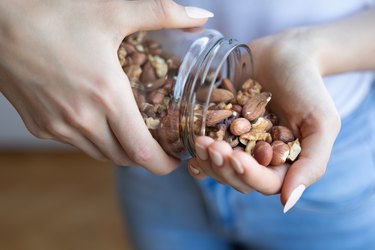
While picking on potato chips doesn't deliver much in the way of nutrients, choosing the right kind of snack can positively affect your health today and in the future.
Yep, if you're strategic about your snack choice, these itty-bitty in-between bites boast big benefits, like helping to fight off harmful free radicals and prevent serious diseases. One snack option offers all this and more. We're talking about nuts, folks.
Video of the Day
Video of the Day
Nuts are little bundles of nutrients, says Laura Burak, RD, CDN, author of Slim Down With Smoothies. They contain antioxidants, vitamins, minerals, fiber, plant-based protein and heart-healthy fats: all essential substances your body needs to function optimally now and for years to come.
It's true: studies show that people who eat nuts daily live longer than those who don't, according to Harvard Health Publishing.
Read on to learn why eating nuts every day is linked to longevity.
1. Nuts Are Rich in Antioxidants
Nuts are high in antioxidants (i.e., substances that protect your cells from the oxidative damage that contributes to the development of chronic diseases).
"Because nuts contain different amounts of various antioxidants, you can get a nice variety in your diet just by mixing up your nut choices," Burak says.
But if you want a big antioxidant bang for your buck, bank on Brazil nuts. "Fun fact: even having just one Brazil nut will give you all the selenium you need for an entire day," Burak says. "Selenium is an antioxidant-rich mineral that's linked to protection against chronic disease."
Selenium helps to repair DNA and reduce inflammation — and may play a part in preventing (or reducing your risk of) cancer, cardiovascular disease, cognitive decline and thyroid disease, according to the National Institutes of Health.
2. Nuts Promote a Healthy Heart
If you want a healthy heart, start noshing on nuts.
Eating nuts has been linked to reduced LDL cholesterol (i.e., the "bad" one), higher HDL ("good") cholesterol and lower blood pressure (including stress responses), according to Harvard Health Publishing.
While all nuts contain heart-healthy fats, almonds stand alone as the top nut for your ticker, Burak says. "They're high in vitamin E, fiber and omega-3 fats, which are all heart-protective."
3. They Support Brain Health
Nuts are also amazing for your noggin. Almonds are linked to enhanced memory, pistachios are associated with preventing inflammation and macadamias are tied to supporting healthy brain function. So, a handful of any type of nuts a day can go a long way for improving your brain health as you age, according to Northwestern Medicine.
But when it comes to the ratio of omega-3 fats (especially a type called ALA, which has been linked to brain health and fighting inflammation), walnuts are at the top of the nut food chain, Burak says.
What's more, compared to other nuts, walnuts also dish up double the antioxidants to help combat cognitive decline, per Northwestern Medicine.
4. They’re Good for Gut Health
If you want to keep your gut functioning and your poop flowing smoothly, reach for a handful of nuts.
Here's why: most nuts contain both soluble and insoluble fiber, which are beneficial for gut health, Burak says. Yep, fiber is fundamental for a happy gut.
For one, it softens and bulks up your stool, which makes your poop easier to pass (read: it combats constipation), according to the Mayo Clinic. And this is especially important because your bowels are more likely to get backed up as you age.
High-fiber diets also improve bowel health by reducing your risk of diverticular disease and colorectal cancer, per the Mayo Clinic.
Plus, some evidence shows that eating nuts may affect the gut microbiome and have a prebiotic effect (though more studies are needed), according to an August 2020 review in Nutrients.
ICYMI, prebiotics are a type of fiber that provides food for probiotics, i.e., the beneficial bacteria in your gut.
5. Nuts Could Help With Weight Management
Some people are wary of eating nuts because they're high in fat, fearing that they may cause weight gain. But take heart: Noshing on nuts is a good way to get the nutrients your body needs to maintain a healthy weight.
"Nuts are my number one favorite food to recommend to clients for both overall health and weight loss," Burak says.
In fact, research shows that frequent nut eaters are less likely to put on pounds, according to Harvard Health Publishing.
That's because nuts are high in protein, fiber and healthy fats, which help stabilize blood sugar, keep your stomach satisfied and curb cravings, especially between meals, Burak says. And when you feel satiated, you're less likely to overeat.
Maintaining a healthy weight is key to living longer as people with obesity have a greater risk of developing chronic diseases such as high blood pressure, type 2 diabetes, coronary heart disease and stroke, according to the Center for Disease Control and Prevention.
How Many Nuts Should You Eat for the Longevity Benefits?
While nuts are nutrient-dense, they're also high in calories. So, enjoying more than one or two handfuls a day can add up, according to Harvard Health Publishing.
As a general guideline, "stick with about an ounce, or somewhere around 30 to 35 nuts (depending on the size of the nuts) or two tablespoons of nut butter," Burak says.
"I am a big fan of individual nut packs to help with convenience and portion control."
- Harvard Health Publishing: “Eating nuts linked to healthier, longer life”
- National Institutes of Health: “Selenium”
- Northwestern Medicine: “Best Foods for a Healthy Brain”
- Nutrients: “Nuts and their Effect on Gut Microbiota, Gut Function and Symptoms in Adults: A Systematic Review and Meta-Analysis of Randomised Controlled Trials”
- Mayo Clinic: “Dietary fiber: Essential for a healthy diet”
- Center for Disease Control and Prevention: “Adult Obesity Causes & Consequences”
- Harvard Health Publishing: “Avoiding nuts and seeds for better gut health? You shouldn’t”